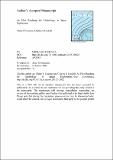An ESA roadmap for geobiology in space exploration
Abstract
Geobiology, and in particular mineral-microbe interactions, has a significant role to play in current and future space exploration. This includes the search for biosignatures in extraterrestrial environments, and the human exploration of space. Microorganisms can be exploited to advance such exploration, such as through biomining, maintenance of life-support systems, and testing of life-detection instrumentation. In view of these potential applications, a European Space Agency (ESA) Topical Team “Geobiology in Space Exploration” was developed to explore these applications, and identify research avenues to be investigated to support this endeavour. Through community workshops, a roadmap was produced, with which to define future research directions via a set of 15 recommendations spanning three key areas: Science, Technology, and Community. These roadmap recommendations identify the need for research into: (1) New terrestrial space-analogue environments; (2) Community level microbial-mineral interactions; (3) Response of biofilms to the space environment; (4) Enzymatic and biochemical mineral interaction; (5) Technical refinement of instrumentation for space-based microbiology experiments, including precursor flight tests; (6) Integration of existing ground-based planetary simulation facilities; (7) Integration of fieldsite biogeography with laboratory- and field-based research; (8) Modification of existing planetary instruments for new geobiological investigations; (9) Development of in situ sample preparation techniques; (10) Miniaturisation of existing analytical methods, such as DNA sequencing technology; (11) New sensor technology to analyse chemical interaction in small volume samples; (12) Development of reusable Lunar and Near Earth Object experimental platforms; (13) Utility of Earth-based research to enable the realistic pursuit of extraterrestrial biosignatures; (14) Terrestrial benefits and technological spin-off from existing and future space-based geobiology investigations; and (15) New communication avenues between space agencies and terrestrial research organisations to enable this impact to be developed.
Citation
Cousins , C R & Cockell , C S 2016 , ' An ESA roadmap for geobiology in space exploration ' , Acta Astronautica , vol. 118 , pp. 286-295 . https://doi.org/10.1016/j.actaastro.2015.10.022
Publication
Acta Astronautica
Status
Peer reviewed
ISSN
0094-5765Type
Journal article
Description
This work was supported by the European Space Agency under the Topical Team, 'Geobiology in Space Exploration'. Claire Cousins is funded by a Royal Society of Edinburgh Research Fellowship, co-funded by the Marie Curie Actions FP7 Programme.Collections
Items in the St Andrews Research Repository are protected by copyright, with all rights reserved, unless otherwise indicated.

